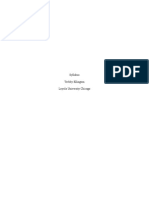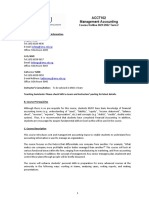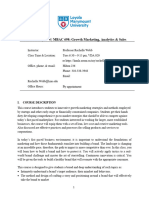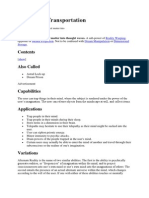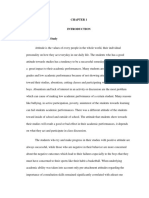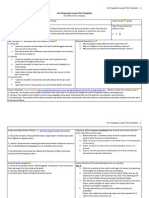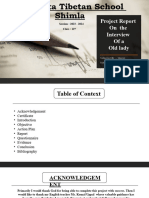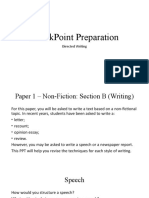LSPR Syllabus ECSR ECorpSocRes p08 FINAL Ok
LSPR Syllabus ECSR ECorpSocRes p08 FINAL Ok
Uploaded by
elearninglsprCopyright:
Available Formats
LSPR Syllabus ECSR ECorpSocRes p08 FINAL Ok
LSPR Syllabus ECSR ECorpSocRes p08 FINAL Ok
Uploaded by
elearninglsprOriginal Description:
Original Title
Copyright
Available Formats
Share this document
Did you find this document useful?
Is this content inappropriate?
Copyright:
Available Formats
LSPR Syllabus ECSR ECorpSocRes p08 FINAL Ok
LSPR Syllabus ECSR ECorpSocRes p08 FINAL Ok
Uploaded by
elearninglsprCopyright:
Available Formats
Online S2 Communication Studies LSPR.
Course: ECSR eCorporate Social Responsibility
PROGRAMME TEACHING GUIDANCE
Postgraduate Programme of
The London School of Public Relations-Jakarta
Revision: 02
Course
Subject
ECSR eCorporate Social
Responsibility
Teaching Team
SCU
Pre-requisites
4 (four) credits
NONE
Valid date
Syllabus designed by
No
.
Category
Ida M. Bayuni, M.M. (Course Coordinator
bayuni.ida@gmail.com;
ida.bayuni@yahoo.com )
31st March 2016
Ida M. Bayuni, M.M.
Description
This Corporate Social Responsibility (CSR) course introduces students to increase awareness of
the climate change & social issues in global & local marketplace that have fuelled a growth in
CSR & Sustainable Development programmes.
CSR / Sustainable Development is often linked with environmental issues such as water &
energy use; a growing number of Firms are taking sustainability efforts much further by
improving work conditions in their supply chain, creating better safety procedures, & reaping
profits from products that address environmental & social problems.
Regulators & investors are asking for it, customers are demanding it, & employees are
expecting it. You reach to a point where a customer says: What are your policies in terms of
your supply chain operations?.
Course
Description
Firms often engage in sustainability in the following three stages:
1. Compliance: by complying with regulations, where activities which arent necessarily
strategic nor centralized. In addition to compliance, employees may volunteer to work on
recycling projects or green teams.
2. Efficiency: For firms to become more strategic about sustainability by finding ways to
achieve efficiencies that will save corporate dollars, by cutting energy & water use or
reducing waste generation & carbon emissions.
3. Innovation: Moving to a more advanced stage -> the innovative stage-> by integrating
sustainability into the core of the business in ways that transform the firm. Firms can focus
on maximizing long-term profitability, & sustainability efforts to address bigger problems
in society, including climate change, water management, & obesity.
To what extend should CSR / Sustainable Development programmes be the responsibility of
public relations professionals? This course looks at different types of CSR / Sustainable
Development activities, how they evolve & expand to a wider context, hence introducing key
areas of argumentations.
The role of public relations professionals is to help an organisation develop & maintain
reciprocal relationship with its stakeholders (the general public) who have the influence over
their future & their businesses.
Learning
Outcomes
LSPR1603
Communicating a thoughtful strategy for a responsible & sustainable business is meant to
ensure that the meaning & scope of CSR / Sustainable Development Programmes be
extended to all stakeholders.
After completing this course, students are expected to be able to Fully comprehend the
importance of:
L1: putting in place the CSR / Sustainable Development programmes strategically & the
effective implementation, by engaging stakeholders -> all aimed at reducing negative
impact the organization has towards the environment, community & social at large.
L2: communicating effectively by means of developing communication strategies to
support & echo the organizations CSR / Sustainable Development programmes to reach
relevant stakeholders.
1 of 8
Powered by HarukaEdu.com
Online S2 Communication Studies LSPR. Course: ECSR eCorporate Social Responsibility
No
.
3
Category
Description
Grading
A : 90-100; A- : 85-89.99; B+: 80-84.99;B: 75-79.99; B-: 70-74.99; FAIL: Below 70.00
No
Component
.
1 Weekly Post Quiz
2 Weekly Group Discussion
Assessment
Component
Weight
CILO
Due date
5%
5%
1,2
1,2
End of every week *
Every Sat 1900pm WIB
End of week 12 (Session 11),
Sat 28thMay*
End of weeks 14, 15 or 16
(Sessions13,14 or 15), Sat
11th,18th or 25th Jun 2016*
End of week 4 & 10 (Sessions
04 & 09), Sat 2nd Apr & 14th
May 2016*
Sat 7th May 2016 (at
campus)
Sat 23rd Jul 2016 (at
campus)
One (1) Group Assignment
5%
1,2
One (1) Group Online
Presentation
5%
1,2
Two (2) Individual
Assignments
10% **
1,2
Mid-Term Exam [UTS]
30%
1,2
Final Exam [UAS]
40%
1,2
TOTAL Grading
100%
All online materials are accessible from elearning.lspr.edu website
Assignments are all submitted online from elearning.lspr.edu website
* Saturday at 23:50 pm WIB
** Each Individual assignment is graded at 5% each towards final grade
Lecturers will be available for a live online chat session with students for 60 (sixty) minutes
during the following timeslots,
Day
Consultation slot (WIB*)
Saturd
A
19:00pm to 20:00pm WIB
ay
*WIB: Western Indonesia Time
Class
Lecture live
chat via
HipChat
Class policies
Lecturer
Ida M. Bayuni, M.M.
Note: National holidays. If the
Saturday is a national holiday, then the live chat will be moved earlier by one day, to
the Friday of that same week.
Online Chat is accessible from https://harukaedu.hipchat.com/chat website or download for
free from Google Playstore for android devices & Apple Appstore for Apple devices.
Students are expected to,
Complete 100% every weekly activity: Pre & Post quizzes, practices quizzes, View class
video, audio, transcript, presentation slides, Twice weekly Group discussion assignments
before the end of every weekly session (Saturday by 23.50 pm WIB)
Participate in group forum discussion & twice weekly chat regularly.
Plan In obtaining any notes, announcements, & so on from their fellow class mates, in the
event of emergencies.
Arrive at class on time for each on campus session. At campus sessions will begin promptly,
& tardiness is an interruption that is both rude & distracting for both the instructor &
students. Note that any information students miss as a result of being late is their
responsibility.
Absence policy
Students who do not complete 100% of every weekly activity before the due date, will
be considered not present in that session.
The maximum number of absence in this course is four (4) times.
If the student has four or more absence, the student will not be allowed to take the final
LSPR1603
2 of 8
Powered by HarukaEdu.com
Online S2 Communication Studies LSPR. Course: ECSR eCorporate Social Responsibility
No
.
Category
Description
exam.
Hence the failed student will have to re-take the course in future semesters to pass the
course.
For at campus session, to provide a classroom that is conducive to learning, please refrain
from,
Answering cell phones or replying to text messages
Engaging in conversations with fellow classmates outside of the scope of the class
Any other disruptive behaviour
Peer review
Class
Environment/P
olicies
Description of
Teaching
Method
10
Academic
Honesty
11
AntiPlagiarism
Policy
LSPR1603
Academic dishonesty in any form will not be tolerated. Students are encouraged to become
familiar with the LSPR Code of Conduct as they relate to academic dishonesty/cheating.
All assignments are due on the date specified in the discussion with the lecturer.
Students may, however, turn in any assignment in advance of the due date.
Only important topics will be discussed in class, & it is the students responsibility to read other
related topics.
To ensure fairness in grading of group assignment, students will be requested to conduct
anonymous peer review every end of the semester/ course. Students are encouraged to
grade their group peers fairly using an online matrix that covers individual contribution
towards group discussions & group assignments.
In order to achieve previously identified course objectives, we will follow an interactive
class format. Students are expected to come to class on time, take notes & prepare the
assigned class material for each session by doing some readings and/or case studies.
In the interest of providing a meaningful learning experience & creating & exciting class
environment, students thoughtful participation is required, whereby students own
experiences, comments, anecdotes ought to be shared, including relevant issues & question
raised in class.
Considering the intensive nature of this module & heavy emphasis on class discussion &
interaction, attendance of all sessions & class participation are necessary for a
successful completion of this course.
The course method will consist of lectures, facilitation, presentations, assignments & paper
submission. The lecturer organizes, supervises & facilitates the class as well as conduct lectures
in the first few meetings. The students will then be asked to lead class discussions & make
report presentations. For their own benefit, students are expected to read the assigned
chapter(s) prior to the pertinent class sessions, & optional reading (choices from suggested
reference books or other related PR books).
Short case studies that illustrate the complexities of Corporate Communications
management & invite students to apply their ideas in practical problem solving.
Classroom participation is expected & required. This will be evaluated using a selfevaluation format.
Group assignment with the objective of getting a deeper understanding into some
important concepts & applications. With this assignment, students will have to analyze
Corporate Communications management case studies & present professional presentation.
Group participation is expected & will be evaluated using a group & self-evaluation
format. Assessment is based on the quality of group assignment, contribution to the
coursework, & involvement in the class. It must be noted that group assignment means
members of the group are to work as a team, & there should be no free riders!
Any type of activity that is considered dishonest by reasonable standards may constitute
academic misconduct. The most common forms of academic misconduct are cheating &
plagiarism. All instances of academic dishonesty will result in a grade of zero for the work
involved.
All assignments will need to have a signed declaration on the 2nd page (after the cover) that
the material submitted is the students own work & that all work taken from other sources is
properly acknowledged.
3 of 8
Powered by HarukaEdu.com
Online S2 Communication Studies LSPR. Course: ECSR eCorporate Social Responsibility
No
.
Category
Description
Use this wording on the 2nd page of each report :
I certify that the attached assignment is my own work & that any material obtained from other
sources has been acknowledged.
I grant permission to the London School of Public Relations to make copies of assignments for
assessment, review and/or record keeping purposes. I note that the London School of Public
Relations reserves the right to check my assignment for plagiarism.
Signed Date
Penalty for students who performed plagiarism: FAILED from the subject.
1st / cover page:
Course title
Topic title
Student Name:
NIM:
Class:
Concentration:
Lecturer name:
Sekolah Tinggi Ilmu Komunikasi
eLearning Postgraduate Programme of LSPR
City, Month, Year
2nd page:
I certify that the attached assignment is my own work & that any material obtained from other
sources has been acknowledged.
I grant permission to the London School of Public Relations to make copies of assignments for
assessment, review and/or record keeping purposes. I note that the London School of Public
Relations reserves the right to check my assignment for plagiarism.
Signed Date
PGP applied APA (American Psychological Association) as references system for all paper
work in each subjects (latest version is 6th Edition, 2010).
12
Referencing
13
General Policy
14
Attendance
Policy
15
Online
Etiquette
LSPR1603
1.
2.
3.
4.
Worldwide accepted International/ national conferences & reputable journals.
Up dated revisions.
Easy for students: Students will learn while practicing this references before doing thesis.
Easy to learn : www.apastyle.org & feel free to come to the Thesis Depart. (on the 9th
floor with Ms.Sari/Hani) & ask for softcopy file.
Students must abide by policies in the LSPR Student Handbook, & the Basic Graduate Student
Responsibilities.
Students are expected to log in & participate as part of their learning in the course. Instructors
establish specific policies relating to absences in their courses & communicate these policies to
the students through the course syllabi. Individual instructors, based upon the nature of the
course, determine what effect excused & unexcused absences have in determining grades &
upon students ability to remain enrolled in their courses. LSPR reserves the right to determine
that excessive absences, whether justified or not, are sufficient cause for institutional
withdrawals or failing grades.
It is expected that students in this class will conduct themselves with good sense, courtesy, &
dignity in all course-related activities. This includes your behavior towards other students & the
instructor. Inappropriate language or flaming will not be tolerated & can negatively affect
your grade.
It is imperative that students in an online environment exhibit proper online etiquette &
appropriate online behaviors. Students deemed to exhibit inappropriate online behavior may
be dropped from the course.
Students are expected to participate in all discussions & virtual classroom chats when directed
to do so. Students are to be respectful & courteous to others in the discussions. Foul or abusive
4 of 8
Powered by HarukaEdu.com
Online S2 Communication Studies LSPR. Course: ECSR eCorporate Social Responsibility
No
.
Category
Description
language will not be tolerated.
Discussion, chat, & e-mail spaces within this course are for class purposes only, unless otherwise
stated. Please remember to conduct yourself collegially & professionally. Unlike in the
classroom setting, what you say in the online environment is documented & not easily erased
or forgotten.
The following guidelines apply:
Avoid using ALL CAPS, sarcasm, & language that could come across as strong or offensive.
Use proper punctuation, grammar & be sure to edit your contribution before posting.
Read all postings before posting your responses to discussion topics so as to not
unnecessarily repeat information.
Keep chat comments brief & to the point.
Focus on one topic at a time when chatting or posting to discussions.
Remember that unlike in face-to-face learning environments what you say in discussions &
chats is documented & available to be revisited. Choose your words & discussion topics
carefully.
E-mail should only be used for messages pertaining to the course. Please refrain from
sending forwards, jokes, etc. within e-mail.
16
17
18
Communicatio
n Expectations
& Standards
Submission &
Collection of
Assignment
Optimal
LiveChat
LSPR1603
The majority of online class time is spent posting opinions & sharing information. Therefore, it is
very important to communicate with courtesy & professionalism. Professional Courtesy includes
respecting others' opinions, being courteous & respectful, & working together in the spirit of
cooperation. Sexist, heterosexist, & racist language should not be used when communicating in
the course. Slang should not be used in the discussion posts. The same guidelines for
professional communication in the classroom apply to content that a student references in a
discussion or assignment. Please make sure that all content that is brought into the online
classroom is professional in nature. If a student links to material that is non-professional,
derogatory, pornographic, or promotes personal opinion (such as political or religious
agenda) the link will be deleted & the student may be subject to further disciplinary action.
Since we cannot see each other in the online environment, it is hard to tell if a writer is bashful,
bored, sarcastic, angry, or just kidding. Therefore, when you critique your classmates, please
proof-read your responses carefully before you post them. Refrain from slipping into
arguments. Be sensitive & positive in your approach to others, & careful with your words. You
are encouraged to visit the following websites & review proper communications in the
electronic format:
www.albion.com/netiquette/
www.bspage.com/1netiq/Netiq.html
All emails or discussion postings will receive a response from your professor within 48 hours.
You can send email anytime that is convenient for you. Lecturer will check their email messages
during the day throughout the work-week (Monday through Friday) & will respond to email
messages during the work-week by the close of business (5:00 pm) on the day following their
receipt of them. Emails received by lecturer on Friday will be responded to by the close of
business on the following Monday.
When sending email, use your lspr.edu email address. Lecturers have the right to Not
respond to emails that are,
a. Non-lspr.edu, as there is no way to authenticate the sender. Make sure students include
your name, title of the course, time of the course & a brief reason for your email in the
subject line.
b. Without a subject line. Take the time to use proper spelling & grammar in your email.
You are contacting your lecturer, NOT a friend. This is professional email addressing a
specific concern related to your education. Take responsibility for your concern & address
me in a professional manner. Lecturers will always address you with the same
professionalism & courtesy.
c. With improper/bad: grammar, spelling and/or basic professionalisms or courtesies.
In regards to the given Individual & Group assignments, students are expected to,
Submit all assignments before or on the due date specified in the discussion with lecturer.
Late submission will be penalized by -3 (minus three) per day deducted from your score.
To mitigate technical issues, please do the following 3 steps, prior to participating in live chat,
1. Check your internet speed. Visit www.speedtest.net & check whether your internet
5 of 8
Powered by HarukaEdu.com
Online S2 Communication Studies LSPR. Course: ECSR eCorporate Social Responsibility
No
.
Category
(HipChat)
Experience
Description
download or upload speeds are at the minimum of,
512 kbps (for Download) & 256 kbps (for Upload)
Internet speeds lower than the above numbers, could cause a reduction of interactive
levels on our LMS.
2. Refresh your internet browser. Ensure that you have refreshed your internet browser, so
as to experience higher internet speeds. On your laptop/desktop, you could apply the
following short-cut,
Ctrl-Shift-R (for Windows OS users) or Command-Shift-R (for Apple OS users)
For smartphone users, please re-start your handphones instead.
3. Recommended internet browsers. We recommend that you use the latest free internet
browsers from Google Chrome or Mozilla Firefox so you can have an optimal experience
on your laptop, desktop or smartphone (they can be downloaded for free from Google
Appstore or Apple iStore).
Students should first email the LSPR S2 Online Program Helpdesk at Lsprs2@harukaedu.com
for learning or academic issues with accessing your online course or call at +62 858 177
03214
19
Learning
Support
Helpdesk. Our helpdesk,
Can be contacted 24 hours a day/7 days a week via email or freshdesk
(https://harukaedu.freshdesk.com).
Will strive to respond to any email or freshdesk based query within 24 hours.
For callers, the telephone line is available during general office hours, Monday to Friday:
0900am to 1700pm Western Indonesia Time (not including national holidays).
Course Outline (CILO: Course Intended Learning Outcomes)
Ses
sion
CIL
O
1,2
Brief Intro & Exploring CSR Definitions
Definitions & Five CSR Dimensions
1,2
CSR Evolution from Donation to CSR
CSR Evolution & Community Development
Method*
Media
Duration
(hour)
P, D,
Q&A
P, D,
Q&A
At
Campus
2.5
MR6, MR12
Internet
2.5
MR9
P, D,
Q&A
Internet
2.5
MR8
P, D,
Q&A
Internet
2.5
MR5
P, D,
Q&A
Internet
2.5
MR2
P, D,
Q&A
Internet
2.5
MR11
P, D,
Q&A
Internet
2.5
MR1
Individua
l Exam
At
Campus
3.0
Session topic
Stakeholder Approach to CSR
Shareholders & Employees
Customers, Suppliers, Governments, Unions
Competitors et al
Progress Review Exercise
Donation/Charity, Philanthropy,
ComDev, CSR Law in Indonesia
Sustainable Development (SD)
Origins of SD, Sustainable Business,
Traditional Business vs. Company
Sustainability
Sustainability Reporting
Background & SER; Sustainability
Reporting; Current Landscape;
Drivers & benefits
Sustainable Lifestyle
Sustainable Living; Introducing Sustainable
Lifestyles; Ways to Participate
References
1,2
1,2
1,2
1,2
1,2
1,2
MID EXAM Sat 7th May2016
1,2
CSR / Sustainable Development Programmes
Put into Practice Case Study
In Indonesia & overseas
P, D,
Q&A
Internet
2.5
MR3
10
1,2
Best Practices in Indonesia
P, D,
Q&A
Internet
2.5
MR10
LSPR1603
6 of 8
Powered by HarukaEdu.com
Online S2 Communication Studies LSPR. Course: ECSR eCorporate Social Responsibility
Ses
sion
CIL
O
11
1,2
12
1,2
13
1,2
14
1,2
15
1,2
16
1,2
Method*
Media
Duration
(hour)
P, D,
Q&A
Internet
2.5
MR14
P, D,
Q&A
Internet
2.5
MR4, MR13, MR7
P, D
Internet
2.5
MR6, MR7
P, D
Internet
2.5
MR6, MR7
P, D
Internet
2.5
MR6, MR7
Individua
l Exam
At
Campus
3.0
Session topic
Unilever; MedcoEnergi; Bank BRI
Best Practices Overseas
Nike; Samsung; Everest Textile
Raiffeisen Bank
Communicating Your CSR / Sustainable
Development Programmes to Your
Stakeholders
Communication Plan; Decide the Channels
CSR Case Study: Group I Assignment
Work within assigned group,
Prepare a case presentation
CSR Case Study: Group II Assignment
Work within assigned group,
Prepare a case presentation
CSR Case Study: Group III Assignment
Work within assigned group,
Prepare a case presentation
FINAL EXAM Sat 23rd Jul 2016
References
Abbreviations:
*Method: P: Presentation; D: Discussion; Q&A: Question & Answer; Pr: Practice
General: TBD: To Be Decided
Reference List:
No.
Type
Info
Blackstone, Rupert. (2015) How Do We Achieve a Sustainable Lifestyle? Institute of
1
MR
MR1
P
Mechanical Engineers.
Drexhage, John; Murphy, Deborah. (2010) Sustainable Development from Brundland to
2
MR
MR2
P
Rio 2012. Background Paper for Global Sustainability Meeting.
3
MR
MR3
P
GlobeScan (2015) The Sustainability Leaders. Sustainability Survey.
GTZ (2006) Strategic Communication for Sustainable Development : A Conceptual
4
MR
MR4
P
Overview.
Henderson, Rebecca (2015). Making the Business Case for Environmental Sustainability.
5
MR
MR5
P
Harvard Business School.
Ihlen, yvind; Bartlett, Jennifer; & May, Steve (2011) The Handbook of Communication &
6
MR
MR6
B
Corporate Social Responsibility. John Wiley & Sons.
Morsing, Mette & Beckmann, Suzanne C. (2006) Strategic CSR Communication. DJF
7
MR
MR7
B
Publishing
Nobel, Carmen (2015) 3 Ways Firms Can Profit from Environmental Investments. Harvard
8
MR
MR8
P
Business School.
Porter, Michael E.; Kramer, Mark R. (2002) The Competitive Advantage of Corporate
9
MR
MR9
P
Philanthropy. Harvard Business Review.
Power, Kate & Mont, Oksana (2012) Analysis of latest outcomes of academic work on
10
MR
MR10
P
sustainable consumption 2010-2012. ETC/SCP Working Paper.
Scott, Kate. (2009) Review on Sustainable Lifestyles: Project Report. Stockholm
11
MR
MR11
P
Environment Institute.
Smith, Richard E. (2011) Defining Corporate Social Responsibility: A Systems Approach For
12
MR
MR12
P
Socially Responsible Capitalism. University of Pennsylvania.
Warnock & London (2007). The Case for Communication in Sustainable Development.
13
MR
MR13
P
Panos London Illuminating Voices. Panos London
Zipkin, Ami. (2015). Hotels Embrace Sustainability to Lure Guests & Cut Costs. The New
14
MR
MR14
P
York Times.
Notes: Type: MR: Mandatory Reference, OR: Optional Reference
Cat: B: Book, J: Journal, P: Paper, W: Web link
LSPR1603
Code
Cat
7 of 8
Powered by HarukaEdu.com
Online S2 Communication Studies LSPR. Course: ECSR eCorporate Social Responsibility
Session schedule:
Week
Session
1
1
2
2
3
3
Period
Sat12Mar
2016
Mon14-Sat19
Mar 2016
Mon21-Sat26
Mar 2016
Location
Exam
Assignme
nt due
date
At Campus
Online
Online
Week(s)
Session
7
7
Mon18Sat23Apr
2016
Online
4
4
Mon28MarSat02Apr
2016
Online
5
5
Mon04Sat09Apr
2016
Online
Individual
assignment01
Period
Location
Exam
8&9
9
8
Mon25AprSat06May
2016
No Class
Sat07May2016
On Campus
Mid
exam[UTS]*
- 2 weeks -
Assignme
nt due
date
Reading
Week
Week(s)
Session
13
12
Mon30MaySat04Jun2016
Online
Session
Location
10
9
Mon09Sat14May201
6
Online
11
10
Mon16Sat21May201
6
Online
Individual
assignment02
14
13
Mon06Sat11Jun2016
Online
15
14
Mon13Sat18Jun2016
Online
16
15
Mon20-Sat25
Jun2016
Online
Exam
Assignment Group online
Group online
due date
presentation
presentation
*UTS: Ujian Tengah Semester - Mid exam
UAS: Ujian Akhir Semester - Final exam
Group online
presentation
Prepared by :
Checked by :
Assessor (Lecturer)
Internal Verifier (Programme Director)
Tgl.
| 2016
Tgl.
8 of 8
| 2016
12
11
Mon23Sat28May20
16
Online
Group
assignment
17,18,19,20
Mon27JunFri22Jul2016
No Class
- 4 weeks -
LSPR1603
6
6
Mon11Sat16Apr
2016
Online
20
16
Sat23Jul2016
On Campus
Final exam
[UAS]*
Reading Week
Authorized by :
Internal Coordinator
(Head/Deputy of PGP)
Tgl.
|
| 2016
Powered by HarukaEdu.com
You might also like
- CS2102 Advertising Society & AnalyticsDocument5 pagesCS2102 Advertising Society & AnalyticsIS PNo ratings yet
- MODR 1730 B 2021-22 SyllabusDocument17 pagesMODR 1730 B 2021-22 SyllabusBryanna MillsNo ratings yet
- LSPR Syllabus EStratPRPlanning p08 FINALDocument8 pagesLSPR Syllabus EStratPRPlanning p08 FINALelearninglsprNo ratings yet
- LSPR Syllabus EAdvCommTheory p08 FINALDocument8 pagesLSPR Syllabus EAdvCommTheory p08 FINALelearninglsprNo ratings yet
- LSPR Syllabus EStratPRPlanning p08Document13 pagesLSPR Syllabus EStratPRPlanning p08elearninglsprNo ratings yet
- LSPR Syllabus EAdvCommTheory p08Document14 pagesLSPR Syllabus EAdvCommTheory p08elearninglspr100% (1)
- LSPR Syllabus EPrincipleCorpComm p07Document12 pagesLSPR Syllabus EPrincipleCorpComm p07elearninglsprNo ratings yet
- SW 4020 Winter 2015 SyllabusDocument25 pagesSW 4020 Winter 2015 Syllabusapi-282542988No ratings yet
- School of Arts & Sciences Course Syllabus: Click Here For Learning Outcomes BA Social WorkDocument7 pagesSchool of Arts & Sciences Course Syllabus: Click Here For Learning Outcomes BA Social Workapi-432879932No ratings yet
- SW 3020 Syllabus Winter 2014Document30 pagesSW 3020 Syllabus Winter 2014api-282542988No ratings yet
- Spring C 2016 Ugp 80 SyllabusDocument11 pagesSpring C 2016 Ugp 80 Syllabusapi-307935574No ratings yet
- SyllabusDocument26 pagesSyllabusapi-282652008No ratings yet
- SO 105 Syllabus (Fall 2013)Document7 pagesSO 105 Syllabus (Fall 2013)Sahar D. SattarzadehNo ratings yet
- ADM4355A Course OutlineDocument15 pagesADM4355A Course OutlineCatherine LiNo ratings yet
- MGT 321 Courseoutline Summer15Document5 pagesMGT 321 Courseoutline Summer15souravsamNo ratings yet
- 3cu3 Syllabus 2012Document10 pages3cu3 Syllabus 2012vasiliki_bednar6567No ratings yet
- Sowk 493 - Syllabus 2017 RevisionDocument8 pagesSowk 493 - Syllabus 2017 Revisionapi-432879932No ratings yet
- Syllabus Fall 2022 - 08Document15 pagesSyllabus Fall 2022 - 08api-737190289No ratings yet
- SW 4441Document6 pagesSW 4441api-312630116No ratings yet
- SW 3020 SyllabusDocument25 pagesSW 3020 Syllabusapi-311634567No ratings yet
- SW 4442 Syllabus Field Education Seminar Winter 2015Document10 pagesSW 4442 Syllabus Field Education Seminar Winter 2015api-282542988No ratings yet
- Syllabus and Reflective AnalysisDocument19 pagesSyllabus and Reflective Analysisapi-316373913No ratings yet
- LSPR Syllabus EPrincipleCorpComm p07 DRAFTWithNOYellowMarksDocument8 pagesLSPR Syllabus EPrincipleCorpComm p07 DRAFTWithNOYellowMarkselearninglsprNo ratings yet
- BU 408 - Course Outline F2019Document8 pagesBU 408 - Course Outline F2019DiaNo ratings yet
- SW 4010Document21 pagesSW 4010api-312630116No ratings yet
- LSPR Syllabus ECC ECrisisCommunication p09 FINALDocument9 pagesLSPR Syllabus ECC ECrisisCommunication p09 FINALelearninglsprNo ratings yet
- CD 258 Fall 2014 SyllabusDocument5 pagesCD 258 Fall 2014 Syllabusapi-250387135No ratings yet
- Outline MGMT3020 DE01 F23 FinalDocument26 pagesOutline MGMT3020 DE01 F23 FinalChiara CarneiroNo ratings yet
- PSYC 230-02 SyllabusDocument7 pagesPSYC 230-02 SyllabusniororoNo ratings yet
- MGMT1001 Course Outline s1 2012 - 23rd FebDocument16 pagesMGMT1001 Course Outline s1 2012 - 23rd Feb1234x3100% (1)
- Course OutlineDocument10 pagesCourse Outlineapi-289044943No ratings yet
- Course Oultine Jan16Document10 pagesCourse Oultine Jan16api-302662628No ratings yet
- Principles of Public Relations Spring2015-2Document9 pagesPrinciples of Public Relations Spring2015-2Kelly HarrisNo ratings yet
- Social Psy - Syllabus 6-11Document13 pagesSocial Psy - Syllabus 6-11lowebiotechNo ratings yet
- Syllabus Student FA08Document16 pagesSyllabus Student FA08Joshua ValleNo ratings yet
- Organizational Behavior: Facilitator OfficeDocument8 pagesOrganizational Behavior: Facilitator OfficeEci RachelianNo ratings yet
- Grad CBsyl 05Document12 pagesGrad CBsyl 05Muhammad ShahidNo ratings yet
- Iopsychology SyllabusDocument4 pagesIopsychology Syllabusapi-163924874No ratings yet
- MKG210 Course Outline Sem 1 2012Document8 pagesMKG210 Course Outline Sem 1 2012Younusul Haque ShiponNo ratings yet
- MHR 706 - Leading and Working in Teams (Fall 2020) - Updated Course Syllabus (FINAL)Document16 pagesMHR 706 - Leading and Working in Teams (Fall 2020) - Updated Course Syllabus (FINAL)Aby BencentNo ratings yet
- BUS30104 New Course Outline - January 2016 SemesterDocument9 pagesBUS30104 New Course Outline - January 2016 Semesterclara_lee97No ratings yet
- PUBL 211: Introduction To Public ManagementDocument10 pagesPUBL 211: Introduction To Public ManagementJimmy Jamero Jr.No ratings yet
- Sample Syllabus For VSMDocument11 pagesSample Syllabus For VSMRhea ArucioNo ratings yet
- ADM2336E & F Course OutlineDocument12 pagesADM2336E & F Course OutlineJordan WilsonNo ratings yet
- Module 8 Course SyllabusDocument10 pagesModule 8 Course Syllabusapi-269601467No ratings yet
- Bus30104 New Course Outline - January 2016 Semester 1Document10 pagesBus30104 New Course Outline - January 2016 Semester 1api-302625023No ratings yet
- Published: January 2018 ISBN (Digital) : 978-1-4533-8682-8Document6 pagesPublished: January 2018 ISBN (Digital) : 978-1-4533-8682-8Ajay Kumar BinaniNo ratings yet
- EVNT 6000 Fall Syllabi 2010Document15 pagesEVNT 6000 Fall Syllabi 2010saite1019No ratings yet
- Syllabus For TECH6102Document9 pagesSyllabus For TECH6102api-342200066No ratings yet
- l21 Course Syllabus 2013-2014Document11 pagesl21 Course Syllabus 2013-2014api-236457422No ratings yet
- Syllabus 534B 2015 SpringDocument7 pagesSyllabus 534B 2015 SpringSahit Chowdary GarapatiNo ratings yet
- ACCT102 MA Course Outline 2021-2022 S2 FinalDocument9 pagesACCT102 MA Course Outline 2021-2022 S2 FinalCherlin LeongNo ratings yet
- Course GuideDocument31 pagesCourse GuideLilly BrownNo ratings yet
- Growth Marketing, Analytics, and Sales Syllabus - MSESI MBA - Spring 2024 V1Document9 pagesGrowth Marketing, Analytics, and Sales Syllabus - MSESI MBA - Spring 2024 V1adamnish8812No ratings yet
- Assignment 2 ErpDocument10 pagesAssignment 2 ErpAreeb ShahidNo ratings yet
- Motivating for STEM Success: A 50-step guide to motivating Middle and High School students for STEM success.From EverandMotivating for STEM Success: A 50-step guide to motivating Middle and High School students for STEM success.No ratings yet
- Leadership U.: Preparing Students for College, Career, and Beyond: Grades 11–12: Thriving in College and BeyondFrom EverandLeadership U.: Preparing Students for College, Career, and Beyond: Grades 11–12: Thriving in College and BeyondNo ratings yet
- Assessment and Feedback in Higher Education: A Guide for TeachersFrom EverandAssessment and Feedback in Higher Education: A Guide for TeachersRating: 5 out of 5 stars5/5 (1)
- Online - Uwin.ac - Id: Bachelor in Economics (S.E) : ManajemenDocument13 pagesOnline - Uwin.ac - Id: Bachelor in Economics (S.E) : ManajemenelearninglsprNo ratings yet
- SPRP Wilson SiahaanDocument17 pagesSPRP Wilson SiahaanelearninglsprNo ratings yet
- Rundown Guest Lecturer-ECU-Online Batch 3Document1 pageRundown Guest Lecturer-ECU-Online Batch 3elearninglsprNo ratings yet
- Rundown Guest Lecturer-ECU-Online Batch 3Document1 pageRundown Guest Lecturer-ECU-Online Batch 3elearninglsprNo ratings yet
- Online - Uwin.ac - Id: Bachelor in Economics (S.E) : ManajemenDocument19 pagesOnline - Uwin.ac - Id: Bachelor in Economics (S.E) : ManajemenelearninglsprNo ratings yet
- Online - Uwin.ac - Id: Bachelor in Economics (S.E) : ManajemenDocument14 pagesOnline - Uwin.ac - Id: Bachelor in Economics (S.E) : ManajemenelearninglsprNo ratings yet
- Online - Uwin.ac - Id: Bachelor in Economics (S.E) : ManajemenDocument22 pagesOnline - Uwin.ac - Id: Bachelor in Economics (S.E) : ManajemenelearninglsprNo ratings yet
- Schedule Mid Online-Even 1516.Xlsx - Rev1Document1 pageSchedule Mid Online-Even 1516.Xlsx - Rev1elearninglsprNo ratings yet
- Online - Uwin.ac - Id: Bachelor in Economics (S.E) : ManajemenDocument24 pagesOnline - Uwin.ac - Id: Bachelor in Economics (S.E) : ManajemenelearninglsprNo ratings yet
- Online - Uwin.ac - Id: Bachelor in Economics (S.E) : ManajemenDocument19 pagesOnline - Uwin.ac - Id: Bachelor in Economics (S.E) : ManajemenelearninglsprNo ratings yet
- UWIN CON05 s26Document26 pagesUWIN CON05 s26elearninglsprNo ratings yet
- Online - Uwin.ac - Id: Bachelor in Economics (S.E) : ManajemenDocument15 pagesOnline - Uwin.ac - Id: Bachelor in Economics (S.E) : ManajemenelearninglsprNo ratings yet
- Online - Uwin.ac - Id: Bachelor in Economics (S.E) : ManajemenDocument17 pagesOnline - Uwin.ac - Id: Bachelor in Economics (S.E) : ManajemenelearninglsprNo ratings yet
- IGSBatch4 Online ProgamRev1Document59 pagesIGSBatch4 Online ProgamRev1elearninglsprNo ratings yet
- LSPR Syllabus ECC ECrisisCommunication p09 FINALDocument9 pagesLSPR Syllabus ECC ECrisisCommunication p09 FINALelearninglsprNo ratings yet
- Online - Uwin.ac - Id: Bachelor in Economics (S.E) : ManajemenDocument20 pagesOnline - Uwin.ac - Id: Bachelor in Economics (S.E) : ManajemenelearninglsprNo ratings yet
- Introduction To Online PGP s44Document44 pagesIntroduction To Online PGP s44elearninglsprNo ratings yet
- Introduction To Online PGP s44Document44 pagesIntroduction To Online PGP s44elearninglsprNo ratings yet
- 1st Sesi SAQrev1Document8 pages1st Sesi SAQrev1elearninglsprNo ratings yet
- Online - Uwin.ac - Id: Bachelor in Economics (S.E) : ManajemenDocument25 pagesOnline - Uwin.ac - Id: Bachelor in Economics (S.E) : ManajemenelearninglsprNo ratings yet
- 20160303-Academic Calendar Even Semester 2015 - 2016-Rev6Document1 page20160303-Academic Calendar Even Semester 2015 - 2016-Rev6elearninglsprNo ratings yet
- Mindscape TransportationDocument2 pagesMindscape TransportationSunčica Nisam100% (1)
- PTADocument3 pagesPTAChi QuiñonesNo ratings yet
- Scaling and Content Analysis and Data ProcessingDocument22 pagesScaling and Content Analysis and Data ProcessingabhishekNo ratings yet
- Roger Dodger (Script)Document50 pagesRoger Dodger (Script)Animesh SharmaNo ratings yet
- Kessler, Ronald Sex Differences in Vulnerability To Undesirable Life EventsDocument13 pagesKessler, Ronald Sex Differences in Vulnerability To Undesirable Life EventsTengiz VerulavaNo ratings yet
- Classroom Management QuizDocument4 pagesClassroom Management Quizbiti mohamedNo ratings yet
- Attitude of The Students Towards Academic Performance2.Document22 pagesAttitude of The Students Towards Academic Performance2.Jane Rose Cordovez100% (3)
- MECOP Interview QuestionsDocument6 pagesMECOP Interview QuestionsJacob StoneNo ratings yet
- DLL - Mapeh 5 - Q3 - W2Document6 pagesDLL - Mapeh 5 - Q3 - W2Laine Agustin SalemNo ratings yet
- Cochin Port Employee EngagementDocument26 pagesCochin Port Employee EngagementRaheena.N100% (1)
- ListeningDocument8 pagesListeningayza rajpoootNo ratings yet
- Atw 124 - Introduction To Managerial Pyschology Group Assignment (Group 2)Document66 pagesAtw 124 - Introduction To Managerial Pyschology Group Assignment (Group 2)jia yeeNo ratings yet
- Art Lesson PlanDocument5 pagesArt Lesson Planapi-266431670No ratings yet
- Gramsci and Democracy - Esteve MoreraDocument16 pagesGramsci and Democracy - Esteve MoreraIlker YamanNo ratings yet
- Analogies Homework HelpDocument7 pagesAnalogies Homework Helpafmtibboa100% (1)
- Pipefuls by Morley, Christopher, 1890-1957Document111 pagesPipefuls by Morley, Christopher, 1890-1957Gutenberg.orgNo ratings yet
- Martinez vs. Martinez G.R. No. 162084 June 28, 2005Document3 pagesMartinez vs. Martinez G.R. No. 162084 June 28, 2005Mariana Jessa SerranoNo ratings yet
- CH 6 Organizing Your SpeechDocument21 pagesCH 6 Organizing Your Speechkashif asifNo ratings yet
- The Project Report - FinalDocument14 pagesThe Project Report - Finalnepalman2023No ratings yet
- Class 10 SSTDocument2 pagesClass 10 SSTSurinder PalNo ratings yet
- Case ThomasDocument3 pagesCase ThomasAriela OktafiraNo ratings yet
- Adorno Subject Object (From Frankfurt School Reader)Document12 pagesAdorno Subject Object (From Frankfurt School Reader)Sebastian GardnerNo ratings yet
- Nicholas Boothman Howto Make People Like Youin 9 0 Secondsor Less 437Document14 pagesNicholas Boothman Howto Make People Like Youin 9 0 Secondsor Less 437mrnh9199No ratings yet
- MBA (Project MGMT) - Full Assignment SEM-3 (SMU)Document162 pagesMBA (Project MGMT) - Full Assignment SEM-3 (SMU)nisha1047No ratings yet
- 2-26-19 Formulating WH - QuestionsDocument2 pages2-26-19 Formulating WH - QuestionsMarianne Florendo GamillaNo ratings yet
- 2 Understanding Individual Behaviour PDFDocument7 pages2 Understanding Individual Behaviour PDFPrakashNo ratings yet
- SheetalDocument12 pagesSheetalNaitik SoodNo ratings yet
- Review Home Reading 'A Christmas Carol'Document1 pageReview Home Reading 'A Christmas Carol'Любов БабенковаNo ratings yet
- Leadership and Just CultureDocument24 pagesLeadership and Just CultureMina Maher MikhailNo ratings yet
- Revision PPT Directed WritingDocument9 pagesRevision PPT Directed WritingybNo ratings yet





















